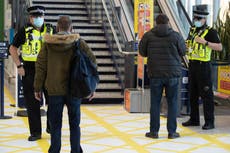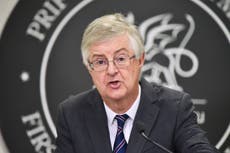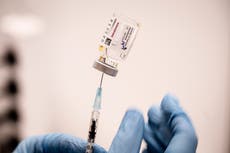Success of vaccine programme could see UK ‘back to normal’ within a year, says top scientist
England’s third lockdown likely to be the last, says Neil Ferguson
The success of the coronavirus vaccination programme has put the UK on track to reopen schools next month, further relax social restrictions in April and be “back to normal” by this time next year, a leading epidemiologist has said.
Professor Neil Ferguson of Imperial College London said he was “hopeful” that England’s third national lockdown will be the last and that as early as May the country will return to tier one or two-style restrictions, with shops, pubs and restaurants open and people able to gather in groups of up to six.
In an interview for Politico’s Westminster Insider podcast, Prof Ferguson said the UK was “in a better place than I might have anticipated a month ago” with lockdown driving down Covid-19 cases fast and vaccines likely to reduce hospitalisations and deaths to “far, far lower” levels by the summer.
“The lockdown has really driven down cases quite fast,” he said. “They’re basically halving about every 17 days at the moment, and that means in a month’s time – the prime minister’s talked about potentially reopening schools, we might have some bandwidth to do that, at least primary schools.
“And if we continue to see then a continued decline without large outbreaks, then perhaps starting to relax other aspects of society the following month.
“I think it will be a bumpy road … but I think we will start to see things become easier, just because the vaccine is going to start having an impact as well as relying on social distancing.”
Prof Ferguson, whose modelling first alerted the UK a year ago to the possibility that as many as 500,000 people could die from Covid-19 without curbs on social and economic life, stressed that there was still a lot of uncertainty about the progress of the disease.
It was not possible to rule out the development of variants which would resist existing vaccines, and likely that people will require jabs to boost their protection every year or two in the future, he said.
But he said that on scientists’ current best estimates, it was “realistic” by May that England will be back in tier two-style conditions, with the “rule of six” for social gatherings and pubs and restaurants serving meals, and less stringent controls in areas with very low incidence.
“Completely relaxing and moving back to something akin to where we were in August – we had some restrictions but much lighter – that will really depend on how we see the earlier relaxations play out,” he said.
“My best guess – my fervent hope – is certainly by this time next year, we will be basically back to normal, without any significant degree of the current controls in place.”
Prof Ferguson said that England’s emergence from lockdown should be taken in stages, with breaks of around three weeks between relaxations in order to see how they play out in terms of increased infections and illness.
He said: “I’m hopeful it will be the final lockdown, so long as we are relatively cautious in coming out of this lockdown.”
As much as one-third of the UK population may already have gained some level of immunity by contracting and recovering from Covid-19, said Prof Ferguson. And this pool of protection is being quickly expanded by vaccination to take the population towards herd immunity status.
“We should be seeing a significant level of protection coming through and driving down deaths and hospitalisations in the coming weeks,” he said.
As over-50s are vaccinated by May and the entire adult population by the summer, “that’s the scenario where we can really start talking about going back to normal, because the combination of people being protected from severe disease and the reduction of transmission generated by the vaccine should keep the clinical burden – the number of deaths and hospitalisations from Covid – far, far lower than we’re still seeing today”.
Prof Ferguson said that the emergence of the more virulent strain of Covid first detected in Kent had been “devastating” to the UK’s death rate from the disease.
With the virus constantly mutating, the likelihood of a dangerous variant arising in the UK was “at least as great, if not greater than” the risk of importing it from countries like Brazil or South Africa, meaning that the tougher border controls being introduced on Monday are “not a panacea”.
But he added: “I think it’s very unlikely we’ll get a strain emerging which can’t be vaccinated against.
“Will we get a strain which sends us back to square one? I can’t be sure of that... It can’t be completely ruled out.”
Some border restrictions, such as requirements for vaccination certificates, were likely to remain in place for years to come, as it was “highly unlikely” that Covid will ever be entirely eradicated from the human population, he said.
Join our commenting forum
Join thought-provoking conversations, follow other Independent readers and see their replies
Comments



Bookmark popover
Removed from bookmarks